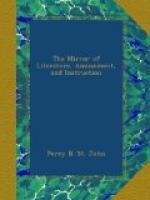[4] This was twenty-eight years since. A writer in an English journal observed three years since, “it is difficult to conceive that one half of the sugar consumed in Great Britain, or in all Europe, will not, in a few years, be home-made beet-root sugar.” In France the manufacture of sugar from beet-root, like that of saltpetre, was dictated by necessity, the former through the capture of the French colonies by Great Britain, during the late war. It is now an important manufacture in that country, as well as a branch of domestic economy, the sugar being made by housewives, and requiring not more skill or trouble than cheese-making or brewing.
Chaptal now retired from political life, and established a chemical manufactory in the neighbourhood of Paris; but he was soon after chosen a member of the Conservative Senate, and made grand officer of the Legion of Honour. In 1806, he was present at the placing of the trophied column in the Place Vendome, to commemorate the battle of Austerlitz. Chaptal was soon after made a Count, and received the grand cross of the Legion of Honour.
In 1813, when the Allies began to approach the French frontiers, Chaptal was dispatched to support the falling power of Napoleon; he failed to do so; and when the Austrians approached the capital, he retired to Clermont, but after the taking of Paris he hastened to the city. He was made a member of the Academy of Sciences upon its re-organization.
Upon the return of Napoleon from Elba, he named Chaptal director-general of manufactures and commerce, and immediately after minister of state, in which latter capacity he pronounced, in the name of all the ministers, a very flattering address to Napoleon. At the restoration of the Bourbons, Chaptal again retired into private life, and continued to enjoy the society of a large circle of literary and scientific friends till his death.
Upon the application of chemistry to the arts of life, Chaptal is considered to have been the most distinguished writer of his time. His works are, Conspectus Physiologicus de Fontibus differentiarum relat. ad Scientias, 1777; Analytical Table of a Course of Chemistry delivered at Montpellier, 1783; Elements of Chemistry; Treatise on Saltpetre and Tar; a Table of the principal Earthy Salts and Substances; an Essay on perfectioning the Chemical Art in France; a Theoretical and Practical Treatise on the Cultivation of the Vine; the Art of making Wines, &c.; the Art of Making, Managing, and Perfectioning Wines, a work which has been productive of great improvement in the wines of many districts in France; the Art of Dyeing Cotton Red; Chemistry applied to the Arts; the Chemical Principles of the Arts of Dyeing and Scouring. M. Chaptal has also furnished many excellent articles to the Annals of Chemistry, and the Dictionary of Agriculture. Among his miscellaneous productions, a paper on Geological Changes is entitled to special mention as one of the most beautiful compositions of its class.




